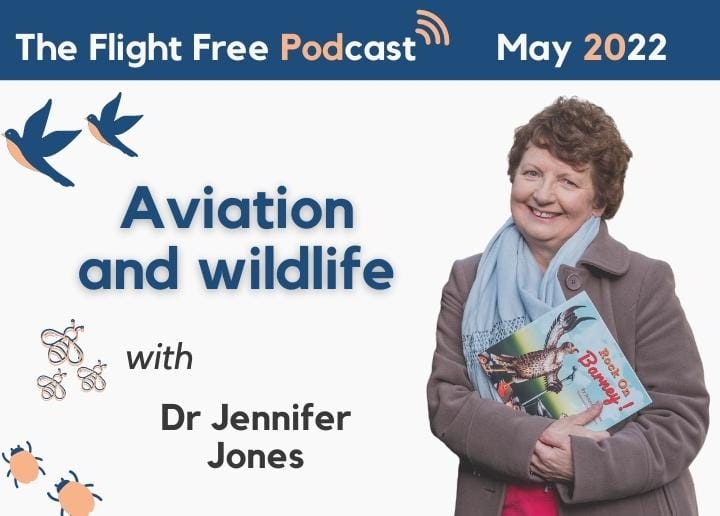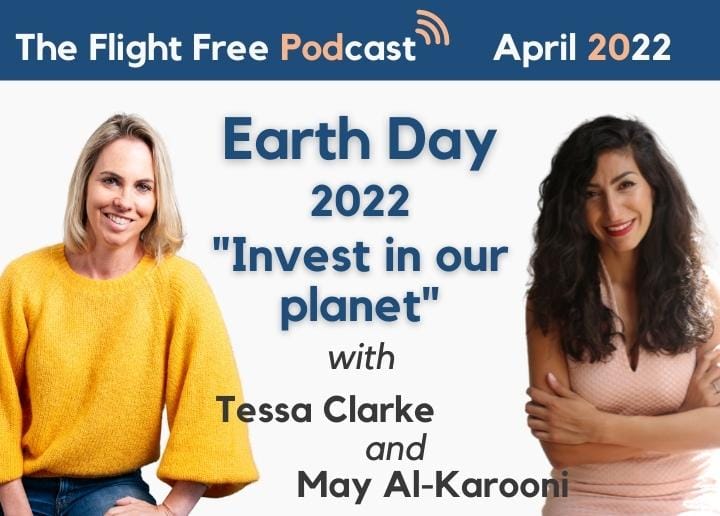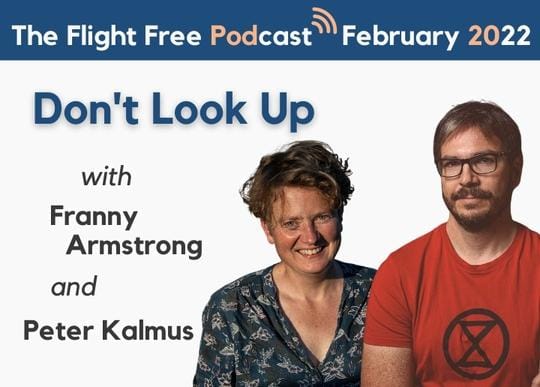This is episode 3 of our 2022 podcast series. Listen to the episode here and find other episodes and previous series here.
In this month’s episode we’re discussing eco-hypocrisy, and what can actually have an impact when it comes to reducing our emissions.
We’ll also be talking about how individual action relates to system change.
Our guest is Sami Grover, who will talk about using our individual leverage for positive impact on our environment, in a world that doesn’t always make it easy to do so. His book ‘We’re All Climate Hypocrites Now’ has been described as ‘honest’ and ‘insightful’ as well as a ‘tour de force for hope’.
Flight Free Fact
It only takes 3.5% of a population to change their habits in order to change the system.
So basing it on the population of the UK, that means we only need around 2.5 million people to sign our pledge… easy peasy right?
A great example of someone who has inspired change beyond their own action is of course Greta Thunberg.
She skipped school on the 20th August 2018 to protest outside the Swedish parliament for more action against climate change. By November more than 17,000 students in 24 countries took part in Friday school strikes, and it’s now a global movement.
Flight Free UK
Hi Sami! Welcome to the podcast. What do you mean by the term ‘eco-hypocrite’?
Sami
We all live in a system that runs on fossil fuels. As much as we would like to move away from it, we have no option but to live within that system. So we all end up in this place where our ideals are bumping up against what we can actually do.
For example, I once vowed never to fly again, but the last flight I took was a work trip and I promptly fell in love with someone on the other side of the Atlantic. So I’ve been flying regularly and feeling bad about it ever since.
“Our movement often focuses on personal purity, but what we should be looking at is our specific power to make change.”
Our movement often focuses on personal purity, but what we should be looking at is our specific power to make change. That’s not to say that what we do in our personal lives doesn’t have an impact, because it does: if you choose not to fly then you are making a significant impact on both your direct emissions and the systems around us, but the larger part of that is the impact you’re having on the system.
So we need to figure out our own place in the system, where we have the most power, and where we can cut ourselves and others some slack.
Flight Free UK
How did you find your individual leverage?
Sami
I'm still working on this. A lot of it comes down to identifying your skills and finding your position in society. I have a very limited set of skills and they're mostly writing, so I put a lot of effort into communications. For me, it was looking around and asking ‘Where can I start pushing?’
Flight Free UK
In your book “We’re all climate hypocrites now” you write about targeting our individual actions to create systemic change. Could you tell us more about this and the book itself?
Sami
The book started out as an attempt to get rid of the guilt that I and others might have been feeling. I felt that the individual carbon footprint was not the most helpful metric and was leading us all down this path of self flagellation, and I thought we should be focussing solely on systems.
While researching the book I realised that I was entirely wrong: even those who fight hard for system change still take action in their own lives, and those who take extreme individual action know that we need top-down change to get where we need to be. The book is an attempt at trying to bring systemic change and individual action together.
Flight Free UK
How can we ensure that embracing our climate hypocrites doesn't backfire? Some people might take the concept of eco-hypocrisy as an opportunity to sit back. How can we ensure that it’s a term that’s encouraging rather than demotivating?
Sami
That was my concern about writing the book. The one thing I do not want this book to do is demotivate you from making changes that create a positive impact.
I hope the book encourages people to find those places that work for them, but also to be understanding that what works for you might not work for somebody else. And if that’s the case, it does not mean that you two are opposed or standing against each other, it means that you are working on different pieces of the puzzle.
”What works for you might not work for someone else. It does not mean you are opposed, it means you are working on different pieces of the puzzle.”
In the book I also explore the function of shame. It is an important social regulator. We feel shame when we do something that is outside of social norms and when people witness us doing something outside of social norms. It can be used powerfully to change behaviours. But the trouble is, the more we use it, the less powerful it becomes.
We should maintain shame as this powerful weapon and target it where we need to use it, as long as we understand the power of shaming, strategically and tactically. It might be that shaming frequent flyers is the right tactic. It might even be that shaming me is the right tactic! I think that’s OK if it has the desired result, but we have to be aware of the consequences and find the right place where it’s going to be effective.
Flight Free UK
What would you say to someone who feels overwhelmed in the current circumstances and is therefore doubting their individual power?
Sami
I would say they are both right and wrong. It’s absolutely rational to say, ‘The plane was going to fly anyway,’ but it's also rational to say that the plane was going to fly anyway because 200 people also decided that.
We need to be at peace with our relative lack of power as individuals, and also recognise this immense power we have to come together and build collective responses. If you are struggling, maybe you are looking at the wrong part of the puzzle. Or maybe you haven't found the right people to look at that puzzle with.
“We need to be at peace with our relative lack of power as individuals, yet also recognise our immense power to come together.”
It’s important to see yourself within these broader systems rather than being isolated and limited to your own footprint. My concern about focusing on carbon footprints is that it brings us into a place where we are asking ourselves ‘how can we be less bad?’, but there's much more power in asking ‘how can we do the most good?’
Flight Free UK
Thanks to Sami for joining us this month. You can read more from Sami at his website where you can also buy his book, ‘We’re all climate hypocrites now’. He’s also on Twitter @samigrover.
Destination of the Month
Every month we recommend somewhere for you to visit. It could be here in the UK or it could be somewhere a bit further afield, but the crucial thing is you can, of course, get there without flying.
This month we’re recommending Sami’s hometown of Clevedon, North Somerset. It’s a lovely seaside town near Bristol with an ornate Victorian pier, good fish and chips, a beach with a swimming area, and beautiful surrounding hills.
This is a summary of episode 3 of our 2022 podcast series. Listen to the full episode here and find other episodes and previous series here.
Credits:
Episode produced by Louise Millington and narrated by Eveline Vouillemin and Louise Millington.
Intro music: The Executive Lounge By Dan Barton. Outro music: Pines and Violet by Sky Toes.




